Maduro Holds on in Venezuela
The key remains the military.
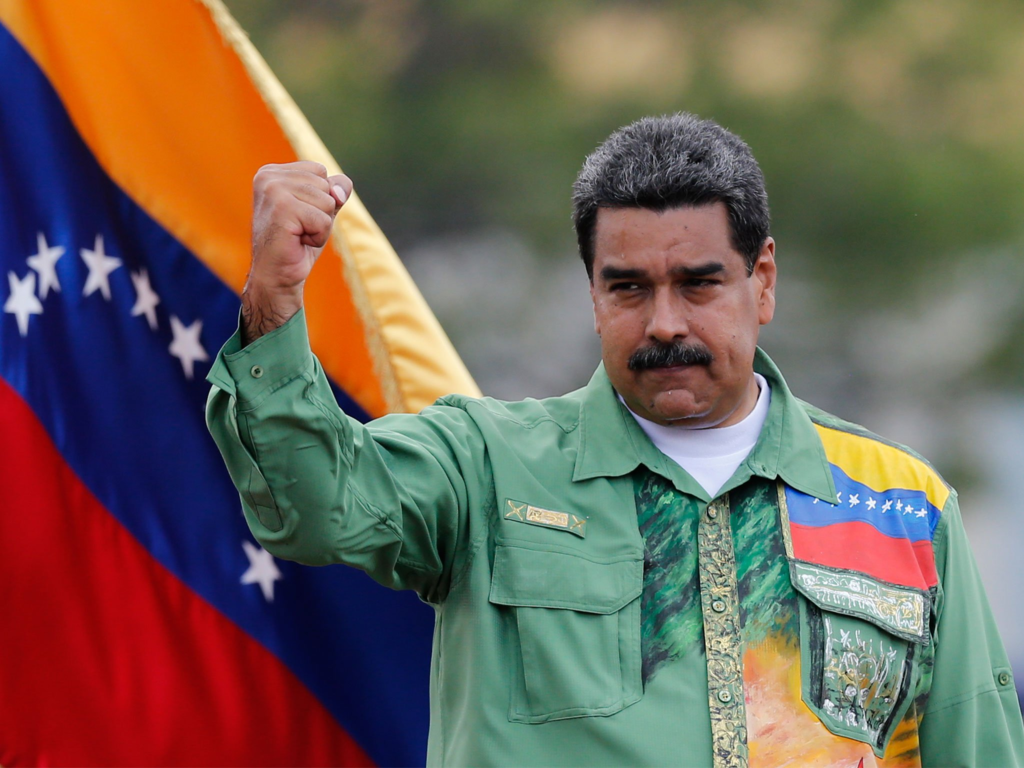 The German sociologist Max Weber, in a famous lecture entitled “Politics as a Vocation,” defined the state as follows: “the form of human community that (successfully) lays claim to the monopoly of legitimate physical violence within a particular territory.” In simple terms, he was addressing the fact that the government which controls a given territory has to have the ability to makes and enforce rules.*
The German sociologist Max Weber, in a famous lecture entitled “Politics as a Vocation,” defined the state as follows: “the form of human community that (successfully) lays claim to the monopoly of legitimate physical violence within a particular territory.” In simple terms, he was addressing the fact that the government which controls a given territory has to have the ability to makes and enforce rules.*
One of the theoretical implications of this fact is that as the state deteriorates, one of the last institutions standing is often the military. It also suggests that for a given regime to hold on to power, control of the force-generating mechanisms of the state (police and military) are essential to maintaining power even in the face of other challenges to said regime or to the weakness of the state itself.
Cue the following in WaPo: How Nicolás Maduro has been able to cling to power.
He rules a nation where inflation is spiraling toward 10 million percent. The United States and about 50 other countries no longer recognize him as president. His popularity has slumped to around 14 percent.
And yet, Nicolás Maduro has so far withstood intense pressure from Washington and a Venezuelan anti-government movement that has filled the streets for weeks, including more rallies on Saturday drawing thousands of people.
The opposition leader, Juan Guaidó, has posed the strongest challenge to Maduro since the former union leader assumed the presidency in 2013.
How does Maduro manage to cling to power? The short answer is that the authoritarian leader has the military on his side. He has ensured their loyalty by offering promotions and allowing them to enrich themselves through state businesses or criminal activities, analysts say.
Indeed, it is what I said back in January:
Maduro’s main and most salient support is coming from the armed forces (and the fact that he still controls the actual government apparatus in general).
[…]
The upper officers of the Venezuelan armed forces have done very well financially with Maduro and they therefore have a lot to lose if he leaves power. While WaPo reports that Venezuela’s opposition in talks with military officials to force out Maduro, Juan Guaidó says in interview, I take such a situation with a grain of salt. While I can certainly see some defections, it is unclear that any of the higher level commanders will see an advantage to switching sides.
The WaPo piece linked above it worth a read. I will highlight three issues:
First, this is a concerning comparison, but it strikes me as possible:
“What happens if you don’t break that military structure and the country continues to deteriorate? You have the terrible scenario of a Cuba or an Iran or a Syria or a Zimbabwe,” said Luis Vicente Leon, head of the Datanalisis polling firm, referring to countries whose authoritarian governments dug in and survived, despite profound economic and political crises.
The Zimbabwe example is especially troubling, as it was a case in which even substantial economic hardship did not lead to the regime being ousted.
Second, really, this is the key:
But ultimately, Leon said, in Venezuela, the issue isn’t whether the military is loyal to Maduro. “The military is not defending Maduro,” he said. “They are defending themselves.”
Third, a quick comment on this:
Leon noted that anti-government movements trying to replace authoritarian leaders in other countries have sometimes had to make unpalatable choices to ensure the military was in line. In Nicaragua, for example, when Violeta Chamorro won the presidency in 1990 and ended a decade of left-wing Sandinista rule, she gave a top Defense Ministry job to Humberto Ortega — the brother of the outgoing president. In Chile, Augusto Pinochet was permitted to stay on as head of the armed forces after stepping down as president.
Humberto Ortega was already Defense Minister when Chamarro was elected. It is less that she gave him the job, but had to accept his continuation as part of the transition. In Chile, Pinochet thoroughly controlled the transition to democracy, and moreover the military maintained a number of special prerogatives for some time after democratization.
Back to Venezuela, I will note that one development in the ongoing situation that I found fascinating was this (via the LAT): Venezuela’s opposition leader Juan Guaido returns home, risking arrest
Venezuela’s self-declared interim president, Juan Guaido, returned to his nation Monday to cheers from supporters and uncertainty about whether Nicolas Maduro’s government would have him arrested.
Guaido arrived at the main airport in Caracas, the capital, just after noon local time and was greeted by hundreds of supporters.
[…]
Guaido, who declared himself interim president on Jan. 23, was returning from a nine-day tour of Latin American countries that included a meeting with U.S. Vice President Mike Pence in Bogota, Colombia. He left his home country despite a travel ban imposed by Maduro, who has continued to threaten the young leader with imprisonment.
Maduro has said Guaido “will have to face justice.” He told ABC in a Feb. 25 interview, “He can’t come and go, and the law has prohibited him from leaving the country.”
Guaido told followers that he had no problem reentering the country. He said immigration authorities at Maiquetia “Simon Bolivar” International Airport did not seize his passport but greeted him with “welcome, president.”
So, is it the case the Maduro lacks the ability to actually arrest Guaidó, or does it mean that he doesn’t take him seriously enough to arrest? The situation continues to be strange, Guaidó clearly has more public support than Maduro, but Maduro has all the levers of power.
Meanwhile, today via the BBC: Venezuela braces for rival protests amid power cuts.
—
*Weber provides in his work the following more well-iterated definition.
The modern state:
1) possesses an administrative and legal order
2) is run by officials bound by that order
3) both the structures and the personnel that man the structures are bound by legislative action
4) has a territorial base
5) within that territorial base it controls a) citizens and b) activities within its borders
6) controls the legitimate use of force within its borders.
Source: Economy and Society (although iterations of these notions can be found throughout his work).

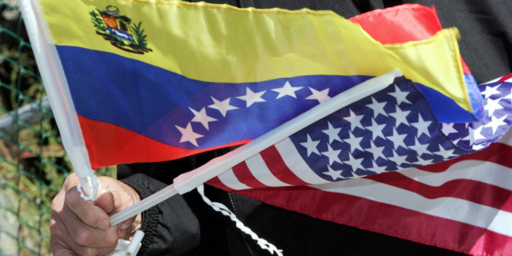
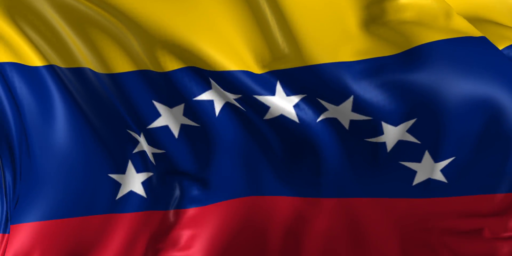
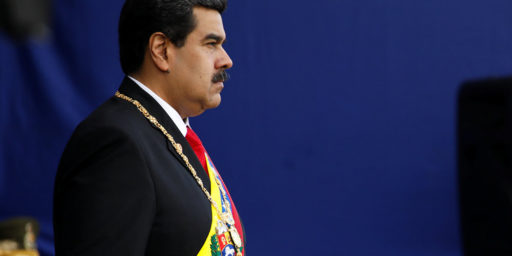
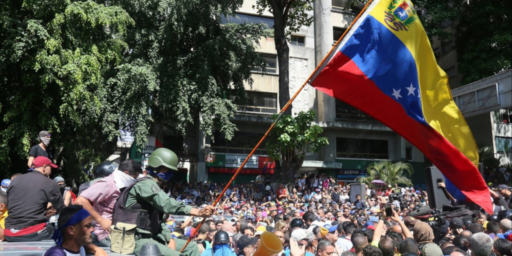
Political power grows out of the barrel of a gun.
Feel free to quote me on that.
In the old days the CIA would either subvert generals in Maduro’s army or assassinate Guaidó. I have a hard time believing the Agency isn’t in the mix there somehow. I wonder how.
Maduro will remain in power till he no longer has the support of the military. Then he’ll be gone, most likely with a bullet to the head. Guaido and his people need to subvert the military leadership by ensuring them they will retain their privileges and will not be subject to prosecution.
If they are not willing to do this, then a successful revolution means that Guaido-ites will need to turn violent and hope that the junior officers will rebel and not support Maduro and the senior officers.
@Michael Reynolds:
Well, sure. It is more than that–but when other legitimate forms of authority start to fade away, all that is left is force.
Even in the old days it wasn’t so simple, to be honest. The most clear-cut example would be the CIA training and arming dissidents in Guatemala in 1953 (the same tactic failed miserable in Cuba about a decade later).
CIA agitated in Chile, but the coup was home-grown.
@Steven L. Taylor:
Iran also comes to mind, here.
Am reminded that at the end of WWII there was an attempted coup d’etat in Japan by a handful of junior officers trying to keep the Emperor’s proclamation of surrender from being broadcast. The senior officers refused to participate, hence the collapse of the attempt.
Question concerning Venezuela: are there similar fault lines?
This is really sad on my part. I have no idea which guy is pictured above. It could be Maduro or that … other guy named like um … Guido or something close to that.
—–
Whoever he is, he has an awesome shirt! I covet his shirt.
I’ve been playing a FO4 mod that is strongly towards the survival mode (Frost) and it is wickedly hard, and I should be prioritizing in order antibiotics, Rad-Away, pure water, sleep, and food.
But that’s a really cool shirt. I wonder what buffs it has.
@de stijl: The CIA did help the coup in Iran as well, yes.
@grumpy realist: I am no expert on the internal workings of the Venezuelan military, but it does appear to be the case the the upper command levels are well entrenched and see no advantage ousting Maduro. There have been some defections (over the border into Colombia) of the lower ranks.
@de stijl: That’s Maduro. And it really is quite a shirt.
@Steven L. Taylor:
I’m betting on Charisma + 2 (maybe even +3). And secondly then +1 Intelligence or Endurance. Maybe Luck. Who knows.
I want his shirt. If I do his quest will he give it to me?
IRL, I once inadvertently asked a super cute Venezuelan woman “What is time?” rather than “What time is it?” as an opening gambit. “Que es el tiempo?” and “Que hora es?” are not equivalent.
My Spanish was worse than my game, or vice versa.
—–
In my playthrough of Mercenries 2 I utterly destroyed the Venezuelan oil infrastructure with airstrikes. Unfortunately, no shirts. Action game with no armor slots.
I do like that shirt. It’s fancy.
In 203 there was a coup against Hugo Chávez. Chávez survived, but he had to build support within the Military. That’s why the idea of the Military simply overthrowing him is wishful thinking. And it’s not like there is no support for him, specially when people like Trump, Pence and Bolsonaro are saying that they oppose him.
This is garden variety police state stuff. The police and military get fed, paid, and have guns.
Next subject……….
@Guarneri: Thanks for reading and commenting, but I can’t help but notice (given a different conversation yesterday) that this is a non-Trump post and your response is to be dismissive,as if the post was pointless.
@Andre Kenji de Sousa:
I think that’s the result of a defective flux capacitor 🙂
Seriously, the military remains key, and, as Doug notes, they are defending themselves rather than Maduro. So the way to overthrow Maduro is to make him a danger or a risk to the generals.
This is very easy to say. It’s Captain Obvious easy. How do you bring it about, aye, there’s the rub. And what do you wind up with?
@Kathy:
Indeed.
And US policy that makes the military nervous and reinforces their support of Maduro is, therefore, counter-productive.
@Kathy:
I think that relaying on a coup by mid-level Army Officers is a pretty dangerous preposition. I don’t know, but I think that the intervention by foreign powers is not helping. That video with Mike Pence was the most idiotic thing in the world.
Maduro blamed the recent blackouts in Venezuela on a cyber attack by the US.
Not to claim he wouldn’t have said that before the Crazy Years (ie the Trump Era), but now he stands a much better chance of being believed.